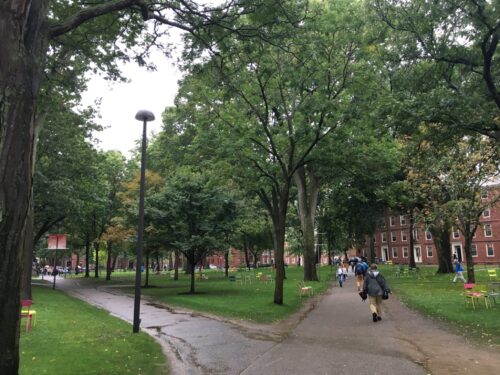The discussion continues.
By PULKIT AGARWAL
The campus has seen an appreciable increase in protests following the Trump administration’s decision to rescind the Deferred Action for Childhood Arrivals (DACA) initiated under President Obama. The Indy got a chance to speak with protesters about their motivations and the responses that they have received from the student body.
One student, Anwar Omeish ’19, who was at the forefront of these efforts, pointed out that the “protests and discussions [have] unfolded really well, and our messaging [has] really [come] through. We wanted to affirm the belonging of students of color, especially Black and Latinx students, and low-income students (and workers!) on this campus, and hold Harvard to a higher standard than the junk science that Charles Murray advances. The feedback we got about the rally and the event afterwards was positive, and I think we accomplished what we wanted to.”
There has been a concerted effort to try and sustain the levels of energy that protestors have shown in the past two weeks, especially immediately following the rescinding of the policy. Further, as a student from the Islamic Society, claimed, “I can’t speak for the Black Caucus, which I worked with on this event [protest], but I think as a general strategy social justice groups and groups for students of color on campus are going to continue building relationships to generate action that addresses all of our issues intersectionally and stand up for every member of our community.”

Meanwhile, this past week saw events organized by various other groups to also help students and faculty on DACA more directly. On September 20, the Harvard Immigration and Refugee Clinical Program and Office for Equity, Diversity, and Inclusion organized a DACA renewal clinic and ‘Know Your Rights’ informational session with attorneys who gave advice on renewing of DACA applications.
The Office for Equity, Diversity, and Inclusion, and Counselling and Mental Health Services (CAMHS) have jointly also initiated a “Reclaiming Your Narrative” support group that meets weekly in front of Memorial Church. The group meets every week at 5:00 pm, and seeks to employ narrative therapy to provide DACAmented students to cumulatively process the toll Trump’s policy is taking on their emotional health, families, and communities. The central theme of this support group is to counter the popular narrative of oppression and provide a cathartic experience of recovery for those affected by the uncertain future of DACA.
The Immigration and Refugee Clinical Program at Harvard Law School continues to encourage students who have DACA to set up a free consultation with them; those whose DACA is set to expire before March 5, 2018 must apply for renewals by October 5, 2017.
Pulkit Agarwal (pulkitagarwal@college.harvard.edu) encourages students to take part in these discussions as the term continues.

